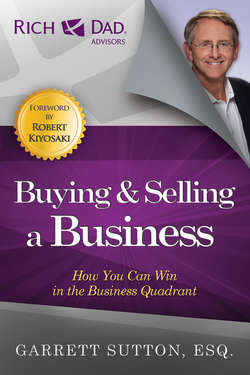Читать книгу Buying and Selling a Business - Garrett Sutton - Страница 19
На сайте Литреса книга снята с продажи.
Case No. 2 – Paris and Richard
ОглавлениеParis was an up-and-coming real estate broker in an affluent area. He had attracted a following by providing excellent and expert service, as well as by being involved in every civic group in town. He was unapologetically aggressive in all of his dealings. He was working for a large national brokerage firm, but was ready to branch out on his own. Rather than build up a real-estate company from scratch, he wanted to save, in his estimation, ten years in establishing name recognition by acquiring an existing business.
Richard owned Piedmont Realty, which had three decent producing offices, thirty brokers and had been in business for over forty-five years. Richard was considering retirement but was concerned about what would happen to the other brokers in the office, whom he considered to be family. When Paris approached him about selling, he was hesitant. He was unsure if Paris was the right person to continue the family tradition of Piedmont Realty.
But Richard was encouraged by his attorney to consider Paris’ expression of interest. The attorney explained that if Richard retired without selling the business his family of brokers would be disbanded anyway. It was at least worth listening to what Paris had to offer.
A contract was drawn up by Richard’s attorney requiring Paris to keep the entire transaction confidential. He was not allowed to speak to any of Richard’s brokers, vendors or customers about the potential purchase. Paris was allowed to review Richard’s financial books and records and speak to Richard’s CPA about the business. He was allowed after-hours access to the office, accompanied by Richard, and that was all. He was given two weeks to engage in a due diligence (investigative) review of Piedmont Realty. Richard didn’t want to waste a lot of time and money on a transaction he didn’t see working out anyway.
Eleven days later, after reviewing the relevant documents and sizing up office procedures, Paris met with Richard. The fatal posturing began. Paris started by pointing out that Piedmont Realty was not search engine optimized. No one could find Piedmont Realty on the internet, which was now a key to real estate success. Paris told Richard to bring Piedmont Realty to current information technology standards would cost $50,000. Paris then said that any purchase price they agreed upon would have to be reduced by $50,000 since that is what Paris would have to invest to get Piedmont Realty found on the internet.
Richard was offended by this opening gambit. He didn’t like the way Paris was handling things, so he cut to the chase. Three key brokers had been with Piedmont Realty for a long time. Cowboy, Jimmie and Evalynn had helped him through thick and thin, and Richard wanted a guarantee that the three could remain for as long as they wanted.
Paris had crunched the numbers. On a per-desk basis, accounting for all overhead and administrative items, each broker had to bring in $3,500 per month for Piedmont Realty to break even. Only Cowboy was meeting that monthly nut. The company was losing thousands per year by having Jimmie and Evalynn, now less productive brokers, taking up desk space. Paris said they would be given six months to increase their productivity to above break-even. If they couldn’t do it, their desk would be given to a more aggressive broker.
That was all Richard needed to hear. Right then and there he decided he would never sell his company to Paris. He would rather lose some money and allow the company to slowly wither away, if that was to be its fate, than to ever make (or allow someone else to make) production demands on the key employees who got him there in the first place.
For Paris’ part, he moved onto the next seller. While he understood Richard’s loyalty to his employees, he was a dispassionate buyer. He could never own a business where there were constraints on who he could terminate. If Richard couldn’t get past his ego and emotion to conclude a sale, so be it. Paris was unemotional and would look elsewhere.
As the case illustrates, frequently the objectives of the buyer and seller are going to be very different. Better to spend a short period of time – a two-week due diligence review – and see if the differences are too large to overcome, than spend months and months of time before getting to the central issues motivating the buyer and seller. This strategy allowed Paris to get to the heart of the matter and move on. It also saved both Paris and Richard from the high legal fees that can add up in the sale of a business. Understanding and overcoming each party’s objectives early on can help lead to a successful sale. The longer key objectives are left unaddressed, the more likely they will be left to explode at the end, thus potentially derailing any sale and wasting a lot of time and money in the process.
